Recalling a school closing that opened a new world
The worst thing that can happen to a teenager is seeing his high school close the summer before his senior year.

The worst thing that can happen to a teenager is seeing his high school close the summer before his senior year.
Actually, a lot worse things could happen. But try telling that to the hundreds of juniors at four Catholic high schools in Philadelphia now scheduled for closure by the archdiocese.
It was hard for me, too, when as a junior I learned there would be no senior season at the school I had spent the past three years carefully cultivating for my path to glory. I had it all set up - classes, teachers, clubs, even a likely girlfriend - only to have it all dashed with the dread announcement that had been expected for several years: Samuel Ullman High School will be closed.
Forty years later, I have a very different perspective. I know now that were it not for my school's closing, I wouldn't have learned some important lessons as early as I did about race relations and public education.
Ullman was closed in 1970 as part of the integration of the black and white schools in Birmingham, Ala. Seven years after the marches led by the Rev. Dr. Martin Luther King Jr., the city's schools were still segregated. Or rather they were mostly segregated. There were a handful of black students at some white schools, including Erskine Ramsay High, which is where I was assigned after Ullman closed.
Ramsay went from being almost exclusively white to about 50-50 black and white. Talk about culture shock. The biggest surprise I had was seeing that not all white kids were like Wally and Beaver Cleaver or other TV characters. Just like black teens, some white kids at Ramsay were in gangs, smoked cigarettes, drank liquor, took drugs, and got pregnant.
Despite the daily discrimination our parents and teachers endured, they tried to teach us that everyone is equal under God. But those lessons didn't resonate until I saw for myself that there was no difference between whites and blacks. Some are good, some are bad - and no one is always either.
The next biggest surprise I got at Ramsay was learning that the education I had been receiving at my separate-but-unequal black school was inferior. I gained an even greater appreciation for students I knew who had graduated from Ullman and were doing well at top colleges across the country.
I didn't know my education was deficient until I sat down in physics and advanced-math classes at Ramsay and discovered I lacked skills possessed by classmates who I insisted weren't smarter than I was. Adding insult to injury, some were also black, but had been at Ramsay before its racial transformation.
That was a blow in the gut. At Ullman, I was respected as a scholar, albeit not always a serious one. Our family lived in the projects, but being good students gave my brothers and me a certain standing among the thugs we grew up with. That didn't mean we never faced challenges, but most of the time they didn't lead to fights.
Anyway, I was embarrassed to be behind my classmates at Ramsay. That hadn't happened since first grade, when I had to work my way up from Group Four in reading to Group One. I had to work harder at Ramsay than I would have at Ullman, but I and another black student, Gail Horne Ray, who is now a successful Baton Rouge, La., lawyer, were named the Class of '71's Most Likely to Succeed.
It's troubling that nearly 50 years after King marched for equality, too many black students are experiencing similar Ramsay moments, in which they, too, come to the sudden realization that their segregated school has provided them with an inferior education. They don't realize they have been deprived until they take a college entrance exam or compare themselves with their white peers in a college class.
A and B black students are rudely awakened to the reality that the pedestal well-intentioned teachers put them on doesn't exist outside the friendly confines of their high school. I don't blame teachers for wanting to make their best students role models whose good grades might inspire their classmates. But it's a tough lesson for the model students when they find out they're not as well-educated as they thought.
Of course, tough lessons can be the best lessons. They last longer because they take more effort. Still, wouldn't it be better if the quality of a child's education were consistent no matter where the school was located or what its student body looked like?
Today's segregated black schools are the result of housing patterns, not mandated by law as they were in the Deep South when I grew up. But too many of these schools are still inferior. Not because most teachers aren't trying, but because, like my teachers 40 years ago, their resources are too frequently inadequate to overcome obstacles to education outside the classroom.
Students in the archdiocese who are weeping because they are being forced to attend schools they don't want to attend will get over the pain one day, and they will likely learn things in their new schools that they wouldn't have learned otherwise. Here's hoping those lessons will prove as beneficial for them as mine were for me.